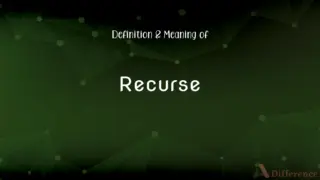Bide Definition and Meaning
By Urooj Arif & Maham Liaqat — Published on April 11, 2024
Bide means to wait patiently for the right moment or opportunity. e.g., She decided to bide her time until the conditions were more favorable for her project.

Table of Contents
Bide Definitions
To wait for a favorable opportunity.
She chose to bide her chance to speak up.
To endure or tolerate.
He had to bide the discomfort until help arrived.
To dwell or reside temporarily.
They decided to bide at the inn during the storm.
To continue in a state or place.
We shall bide here until the morning light.
To persist or persevere.
Through all hardships, she bided with unwavering faith.
To remain or stay somewhere.
The old dog liked to bide in the warmth of the sun.
To abide or stick to a decision.
They bide by their agreement despite the challenges.
To spend time in a specific way.
He bides his days with gardening and reading.
To await an outcome or decision.
The team bided the judge’s final verdict with anticipation.
To remain in a condition or state.
To wait; tarry.
To stay
Bide at home.
To be left; remain.
Past tense bided To await; wait for.
To bear; to endure; to tolerate.
To face with resistance; to encounter; to withstand.
To dwell or reside in a location; to abide.
To wait; to be in expectation; to stay; to remain.
To wait for; to await.
To dwell; to inhabit; to abide; to stay.
All knees to thee shall bow of them that bideIn heaven or earth, or under earth, in hell.
To remain; to continue or be permanent in a place or state; to continue to be.
To encounter; to remain firm under (a hardship); to endure; to suffer; to undergo.
Poor naked wretches, wheresoe'er you are,That bide the pelting of this pitiless storm.
To wait for; as, I bide my time. See Abide.
Dwell;
You can stay with me while you are in town
Stay a bit longer--the day is still young
To comply or agree with.
He decided to bide with the majority's opinion for harmony.
Bide Snonyms
Stay
To remain in a specific place or condition.
We'll stay indoors until the storm passes.
Wait
To stay in place until an event happens or someone arrives.
They decided to wait for the rain to stop before leaving.
Endure
To suffer patiently through difficult conditions.
She endured the waiting period with great patience.
Abide
To accept or act in accordance with rules, decisions, or recommendations.
We must all abide by the law to maintain order.
Reside
To live, especially on a permanent or long-term basis.
They reside in a quaint village by the sea.
Withstand
To resist or endure successfully.
The structure was built to withstand extreme weather.
Remain
To continue to be in the same place or state.
The secrets will remain hidden until the right time.
Dwell
To live or stay as a permanent resident.
Legends say that spirits dwell in these woods.
Persist
To continue steadfastly or firmly in some state, purpose, or course of action.
Despite the challenges, she persisted in her efforts.
Tarry
To delay or be tardy in acting or doing.
Do not tarry on your way home tonight.
Bide Idioms & Phrases
Bide with me
A request for someone to stay or wait with the speaker.
Bide with me; the night is dark, she said during the storm.
Bide one’s time
To wait patiently for a perfect opportunity.
He's just biding his time until a promotion becomes available.
Bide Example Sentences
"I will bide here until you return," she promised.
He decided to bide rather than make a hasty decision.
In times of uncertainty, it's wise to bide and observe.
They had no choice but to bide the storm out in the cabin.
Many adventurers bide at this inn before journeying into the mountains.
To bide in silence can sometimes be more powerful than words.
He chose to bide with his friend during the difficult times.
To bide the cold winter, they gathered ample firewood.
Common Curiosities
How is "bide" used in a sentence?
"Bide" is used to express the act of waiting for a suitable moment or enduring a situation. e.g., She decided to bide her time before making a move.
How many syllables are in "bide"?
There is one syllable in "bide."
What is a stressed syllable in "bide"?
In "bide," the single syllable "bide" is stressed.
What is the pronunciation of "bide"?
"Bide" is pronounced as /baɪd/.
What is the root word of "bide"?
The root word of "bide" is the Old English "bīdan," meaning to wait or endure.
How do we divide "bide" into syllables?
"Bide" is a single-syllable word and is not divided into smaller syllable units.
Why is it called "bide"?
"Bide" originates from the Old English word "bīdan," meaning to wait or endure, reflecting its association with the passage of time or patience.
What is the second form of "bide"?
The second form of "bide" can be either "bided" or the less common "bode," serving as the simple past tense.
What is the third form of "bide"?
The third form of "bide" is "bided," used as the past participle.
What part of speech is "bide"?
"Bide" is a verb.
What is the verb form of "bide"?
"Bide" itself is a verb. Its other forms include "bided" or "bode" (past tense) and "bided" (past participle).
Is "bide" a noun or adjective?
"Bide" is a verb, not a noun or adjective.
What is the first form of "bide"?
The first form of "bide" is "bide," which is the base or present tense form.
Is "bide" an abstract noun?
No, "bide" is not a noun; it is a verb.
Is the "bide" term a metaphor?
"Bide" can be used metaphorically to imply waiting or enduring in a non-literal sense.
Is the word "bide" a Gerund?
No, "bide" is not typically used as a gerund. The gerund form would involve the verb acting as a noun, e.g., "biding."
What is the singular form of "bide"?
"Bide" is both the singular and base form of the verb.
What is the opposite of "bide"?
The opposite of "bide" could be "hasten" or "rush."
Is "bide" a negative or positive word?
"Bide" is neutral; it can be positive or negative depending on the context.
Which determiner is used with "bide"?
Determiners are not typically used directly with "bide" since it is a verb. Usage depends on the object of the verb.
What is another term for "bide"?
Another term for "bide" is "wait."
Is "bide" a vowel or consonant?
"Bide" is a word, not a vowel or consonant. However, it starts with the consonant 'b.'
What is the plural form of "bide"?
As a verb, "bide" does not have a plural form. Its use adjusts according to the subject.
Is "bide" a countable noun?
No, "bide" is a verb and not a countable noun.
Which vowel is used before "bide"?
The vowel used before "bide" depends on the specific context of a sentence, and there is no fixed rule.
Which preposition is used with "bide"?
Prepositions used with "bide" can vary, but "bide by" is a common construction.
Which article is used with "bide"?
Articles are not typically used directly with "bide" as it is a verb.
Is "bide" an adverb?
No, "bide" is not an adverb; it is a verb.
Is "bide" a collective noun?
No, "bide" is a verb and not a collective noun.
Is the word "bide" imperative?
"Bide" can be used in the imperative form to give a command or instruction, e.g., "Bide your time."
Is the word “bide” a Direct object or an Indirect object?
"Bide" is a verb and thus does not serve as a direct or indirect object.
Which conjunction is used with "bide"?
Conjunctions are not specifically tied to "bide" and depend on the sentence structure.
Share Your Discovery

Previous Term
Provoke Definition and Meaning
Next Term
Layover Definition and MeaningAuthor Spotlight
Written by
Urooj ArifUrooj is a skilled content writer at Ask Difference, known for her exceptional ability to simplify complex topics into engaging and informative content. With a passion for research and a flair for clear, concise writing, she consistently delivers articles that resonate with our diverse audience.
Co-written by
Maham Liaqat


































